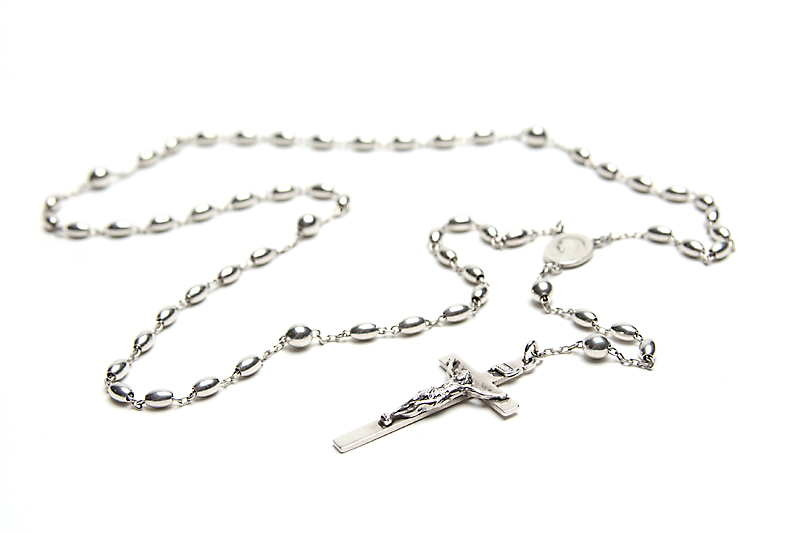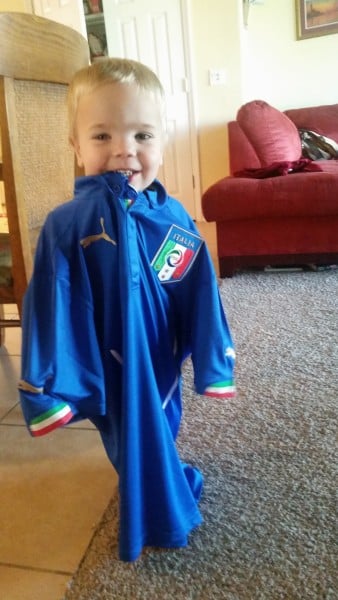
I love the show The Walking Dead. I’ve always loved zombies, but this show, much like Max Brooks’ fait accompli of a novel, World War Z, both scares the pants off me and gives me the most inexplicable hope in humanity.
Fans of the show know that walkers are scary, and they’re a threat, sure — to a point. The real threat, the real fear, lies with human beings. Our unpredictability, our cruelty, our lack of love, our malice, our willingness to turn our backs and deny our brother the humanity he shares with us…whether it be for 30 pieces of silver or a flask of rum, or nothing much, really, except to make us feel more secure.
Walkers are not people. If they’re anything, they’re suffering on legs…slow, lumbering, moaning, snarling, sure as death and just as implacable, but also just as predictable. Once you know them you can be prepared, ward them off, protect yourself, and clear the room. Still, even the best of us can’t prepare for everything. They sometimes catch you off guard and someone you love ends up dead. Or you do. Suffering finds us all, in the end. It’s the human condition.
The true measure of humanity is essentially determined in relationship to suffering and to the sufferer. This holds true both for the individual and for society. A society unable to accept its suffering members and incapable of helping to share their suffering and to bear it inwardly through “com-passion” is a cruel and inhuman society.
When I was pregnant with Lincoln, I wrote a post about how much Natural Family Planning sucks. After he was born, I wrote another post about how terrified I was at the thought 10, 15 more years of fertility. I wrote about how my struggle is not to understand and agree with the Church’s position on birth control, but to find the will to obey and accept the cross that comes with obedience.
They were honest posts that revealed the worst and maybe the best parts of who I am. I am deeply, deeply selfish, I don’t have much courage, and I’d really rather have someone else do all the hard work for me. But I also made a conversion to Catholicism years ago. Conversion was a vow I made, not some great moment of illumination and understanding. Illumination comes and goes, understanding lags a lot, but I chose to put all my eggs in this basket. I will be a Catholic even if I don’t want to, and a good majority of the time I don’t want to. I am always dragging myself back to the confessional, making myself say prayers, stopping in to the adoration chapel for brief seconds at a time. Some days are better than others. Some days are awful. But I will never leave, no matter how much I keep failing to live anything like an authentic Catholic life. I will never, never leave. But I also will not lie about how hard it is.
Lots of people didn’t like those posts. They didn’t think it presented the most beautiful reality of the moral teachings of the Church. I agree, it doesn’t. They were worried that it might repel the curious passerby. I agree, it might. They thought it would be best if I said these things privately, among close friends, and not in public, where it might cause others to stumble in their faith.
Yet society cannot accept its suffering members and support them in their trials unless individuals are capable of doing so themselves; moreover, the individual cannot accept another’s suffering unless he personally is able to find meaning in suffering, a path of purification and growth in maturity, a journey of hope.
After I wrote Fear, Prayer, my inbox was flooded for weeks, months, with emails from disenheartened women the world over who had similar struggles, but no one to talk with. Friends of other religions or no religions think we’re crazy, but most fellow Catholics also think we’re crazy. At least half of the NFP crowd think we haven’t really tried, we don’t really understand our own bodies, we haven’t hit upon the right method, or maybe we just like sex a bit too much. A lot of them think we’re just downright selfish and need to trust in God’s providence and be happy that we have been pregnant and/or breastfeeding for nearly a decade. The other half is mostly just uncomfortable that we’re talking about it at all, especially in public, and wishes we’d make like Alice von Hildebrand and muster up some pudeur. Probably they are all a little bit right, in their own ways. But I’m a convert from Evangelicalism. I chose the crucifix over a bare cross. I chose the suffering, but I also chose a whole worldwide church to suffer along with me. Forgive me my weakness, but I need them. I don’t have too many close friends here, but I do in the virtual church. I need to know that I am not alone, and so do they.
Indeed, to accept the “other” who suffers means that I take up his suffering in such a way that it becomes mine also. Because it has now become a shared suffering, though, in which another person is present, this suffering is penetrated by the light of love. The Latin word con-solatio “consolation”, expresses this beautifully. It suggests being with the other in his solitude, so that it ceases to be solitude.
-Pope Benedict XVI, “Saved in Hope” (Spe Salvi) – emphasis mine
It seems to me that this is the fundamental misconception behind Emma Smith’s recent posts. I know there’s been a lot of concern expressed about her feelings and those of other engaged young women, and more than a little chastising of those who seemed to quash the hopes of a young brides.
One time I had to learn a hard lesson from an innocent conversation with friends. I learned that there are no assurances, not even for me. At first I was confused, angry, and irritated with my friends. But that quickly turned to fear, then terror, then my faith seemed to fall away beneath my feet as I unlearned things I had *known* were true, beyond the shadow of a doubt.
I wince a little, and ache for young brides who read these things and are shaken, confused, and afraid, but I do not believe those things are bad for them to feel. It hurts to have your faith shaken, but it’s necessary to make it stronger…like you have to tear a muscle up to rebuild it. I hope their faith is shaken, but not too hard. Just hard enough for them to learn from it. They’re going to need it. We all need it.
Furthermore, the capacity to accept suffering for the sake of goodness, truth and justice is an essential criterion of humanity, because if my own well-being and safety are ultimately more important than truth and justice, then the power of the stronger prevails, then violence and untruth reign supreme.
Emma seems like a bright, decent, good young woman, and one whose desire for the good outshines her desire for self-satisfaction. I think I was that kind of young woman, or at the least I hope became it, and the lessons I learned most publicly and painfully were the ones that stuck with me years later. Having faith in the goodness of Emma’s character, then, I ask her to consider what role the suffering of wives who have lost husbands, marriages, and families to adultery, or parents who have lost children to drugs, alcohol, and promiscuity, play in this narrative of her life?
We aren’t here as a foil to her sure-fire way to wedded bliss, and she ought not speak of us as such. I know them, these women, these girls even, whose husbands (and whose selves) have been swept away on the tempestuous wind of complex desire. Desire for sex, sure, but also acceptance, respect, love…maybe more than anything, a desire for love. I am them. Is this the message our fellow Catholics have for us? And our children? That God wanted us to have a happy, joyful life, and we didn’t get it because…um, why? We weren’t faithful enough? Good enough? Catholic enough?
Catholic, (from the Greek): Universal.
I used to smoke a lot of crystal meth. My mom knew something was up, but didn’t know what, because I (the only child who could be counted on to be 100% honest about everything ever) lied to her face about it. I didn’t want to, but what could I do? It wasn’t a world she could understand, or help me out of. It wasn’t a world most people understand. I was desperate, and miserable, and freaking crazy, and more than anything else I wanted to have never touched that drug, never heard of, never known it existed. But it was the only thing that made me feel like I didn’t want to claw my own eyes out and jump off a 100-story building. It was the only thing that made me want to get up in the morning. It was the reason for my existence, and reason enough to end it.
There are thousands of parents out there (even Latin Mass Only Catholics) whose kids have descended into drugs, alcohol, promiscuity, hedonism, dungeons and dragons, etc. They don’t know what to do. All they know is that they did the best they knew how to do. Just like my mom and dad.
I can’t speak for everyone whose marriage has been rocked by betrayal, or every parent whose children have slipped shockingly, incomprehensibly away from truth. I can’t speak for any of them, really. I can only speak for myself. In my case, there are a thousand sins that mark the road that led me through dark times. My life has been difficult because I’m primarily interested in trying to make it easy and pleasant. But the lives of the saints tell me that bad husbands happen even to saints, and bad wives happen even to Hosea. The point isn’t why someone is suffering — it hasn’t been since God let Satan torture Job.
Truth and justice must stand above my comfort and physical well-being, or else my life itself becomes a lie. In the end, even the “yes” to love is a source of suffering, because love always requires expropriations of my “I”, in which I allow myself to be pruned and wounded.
As it happens, the women who have been having this heated conversation are all Catholic, which allows me to make an important distinction. We are not Job’s friends. We do not believe in a prosperity gospel.
As Catholics, we believe that marriage is a sacrament. If it is a sacrament, then there must be some sort of promise or guarantee in it, for Christ makes promises to the world through the sacraments and we know that our God always keeps His promises. We also know that marriage is a vocation, one of three ways that people are meant to make it to Heaven. This means that humans can be called to it as a lifestyle in a unique way.
My point in bringing up the idea that marriage is an institution of work and prayer was the idea that it is in the exercise of these two faculties that we attain the promise of Christ in the sacrament. If God calls you to marriage, then He will not abandon you in your effort to live a joy-filled, love-filled, faith-filled marriage. This is what He wants for you. Thus, if we ascribe to the teachings of the Church, if we practice the sacrament and allow the grace of it to permeate our lives, then we can rest in confidence that God will not abandon us in our undertaking.
I can’t help but be struck by how different Pope Benedict’s love sounds from the love that Emma is talking about. Papa B says the love God wants for us is a source of suffering “in which I allow myself to be pruned and wounded.” Emma says God wants us to have a love that is “joy-filled, love-filled, faith-filled.”
I don’t think those two understandings of love are that opposed, really. I’m just more familiar with the kind of love that Papa B talks about. Maybe once I’m good and pruned I’ll be able to be joyful and loving, and faithful. But right now, I have to walk the road under my own feet. That road starts with understanding that God’s ultimate goal is for me is not to be happy, not in this life at least. He wants me to be good. My inclination to be something other than good runs deep, so for me, this means that my life will likely be painful and full of trials. I hope I get better as time goes by and learn to put myself and my desires away more easily. But even if I don’t, the only thing I know for certain is that God will not abandon me in my effort to move closer to Him.
My husband might. I highly doubt it, seeing as how he hasn’t left me yet and I’m significantly less awful than I was seven years ago, but he might. Or he might die. I might have to raise my kids alone, like the Reluctant Widow or Amy Welborn. Or my kids might die, and I might have to live the rest of my life knowing that the source of my trials and all my complaints was also the source of all my joy. I don’t know what will happen in an hour, much less in my life to come. I don’t know what suffering might come my way. All I know is that no matter how bad it is, I can have faith that God will never abandon me. He might let me suffer a little or a lot, but he will be with me through it all.
Love simply cannot exist without the painful renunciation of myself, for otherwise it becomes pure selfishness and thereby ceases to be love.
We are all of us learning how to love the right way, how to recognize and choose good, how to grow in virtue and understanding. Some are farther along than others; some have learned their lessons the hard way and some just recognize truth and accept it. Some are inspired by the divine hope of the Resurrection; some find consolation in the dreadful beauty of the Crucifixion. But what we all have in common, or will eventually, is suffering. We will all suffer — we must, or we cannot grow in virtue. We cannot find God without encountering Christ and His Cross.
Sometimes it’s true that our suffering is brought on by our own sin. But not always. We do each other a disservice when we assume that suffering, in whatever form it takes, is a deserved consequence. We do ourselves a disservice when we assume that we can avoid the same fate through our own virtue.
The body of Christ does not exist so that one part can teach the rest how to avoid suffering. The hand cannot tell the knee, whose job it is to run, that it would not feel so much pain if only it would stop running. The hand can rub the knee and bring some consolation, though, even if only for a moment.
It is enough.
Emma Smith, “Marriage Is Work“
Simcha Fisher’s rebuttal, “God is faithful, but we’re not marrying God“
Emma’s defense, “In Defense of ‘Marriage is Work’“
Me with no filter, “How to Destroy Your Marriage in One Easy Step“
Leticia Adams bridges the gap “Marriage is Not a Fairy Tale”
Melanie Bettinelli’s post on Spe Salvi that made me start thinking “The True Measure of Humanity”
Then, after a heated facebook discussion last night, Simcha responded with
“Love and betrayal and love again“
And now, hopefully, we’re all donesies, cause this has not been the funnest of blogging battles. Mostly because almost no one put pictures in their posts. Booooring, peeps. Major blogging fail. Next time, let’s just agree to have a battle expressed entirely in GIFs, mmkay?











